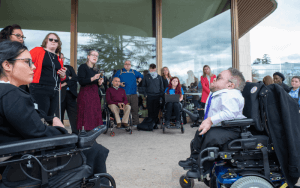The Motability car scheme has been asked to justify tough new rules that restrict grants made to disabled drivers with high support needs, at the same time that its charitable trust has reserves of nearly £200 million.
Last June, the charity secretly introduced new rules for its Specialised Vehicles Fund (SVF), which meant that only disabled people who spend more than 12 hours-a-week in education, work, volunteering or caring would qualify for grants enabling them to lease a drive-from-wheelchair (DFW) vehicle.
The new rules were introduced at a time when the financial assets of the Motability Tenth Anniversary Trust (MTAT) – a charity set up by Motability in 1989 – had risen to £186 million, an increase of £150 million since 1995.
MTAT’s income in 2013-14 was £54.4 million – including a donation of £50 million from Motability Operations, which manages the car scheme – but it only spent £5.5 million of that on grants.
The concerns have been raised by the grassroots, user-led, campaigning network Disabled People Against Cuts (DPAC).
Motability has defended the SVF rule changes, arguing that it has a “finite amount of money”, that the new criteria “allow us to approach applications in a consistent manner”, and that “the complexity and cost of the DFW vehicles makes it inevitable that some criteria will be applied to prioritise applications for support”.
Motability expected to make about 300 SVF grants in 2014-15 for drive-from-wheelchair vehicles (a fall of around 50 on the previous year), while the number of grants for less expensive wheelchair-accessible vehicles was expected to rise by around 500 to about 3,500.
Motability argues that the fall in DFW grants was partly because the annual payment from the Department for Work and Pensions (DWP) into the fund – which is administered by Motability on behalf of the government – has been frozen at £17 million per year since 2012-13, in effect a real-terms cut.
This week, Motability disputed that its new rules were “strict”, but confirmed that MTAT has assets of “circa £180 million”, and was set up to “support the charitable objectives of Motability”.
A Motability spokeswoman said MTAT was “committed to ensuring that, as far as possible, Motability customers can be kept on the road even when periods of high inflation, such as the early 1980s, or economic shocks, such as 2008, put pressure on the affordability of the scheme”.
She said the trust had, in the past, provided some “top-up” funding to the SVF – of about £5 million – in the late 1990s and early 2000s “when government funding was exceptionally constrained”.
She said: “It is vitally important to Motability that we maintain this financial flexibility to see us through both good and bad times in this way.
“[MTAT] maintains reserves for this purpose, as well as providing support for the charitable grants made by Motability each year.”
She said that MTAT had now also agreed to provide financial assistance to former Motability customers when they needed help with “the cost of adaptations, specialised vehicles or otherwise find themselves in exceptional hardship”.
This agreement was drawn up as part of the package of transitional support Motability promised to customers leaving the scheme as a result of being reassessed for the new personal independence payment (PIP), which has been gradually replacing working-age disability living allowance (DLA) since 2013.
The donation of £50 million to MTAT from Motability Operations in 2013-14 was intended to support these measures.
Motability won praise in October 2013 after it announced – as part of this package of measures – that it would hand £2,000 to every disabled person who had their vehicle taken away after being reassessed for PIP and had joined the scheme before January 2013.
A Motability spokeswoman said: “The spending of £5.4 million reported [by MTAT] in 2013-14 includes support both for charitable grants and for customers affected by PIP reassessments.
“Crucially, though, given the pace of PIP reassessments is accelerating, [MTAT] spending will increase considerably over the coming years.”
By 2018, DWP is expected to have reassessed about two million working-age DLA claimants for PIP, which will include about 360,000 of the 630,000 disabled people who lease a vehicle through Motability.
The Motability spokeswoman said: “The £50 million donation received in 2013 will be used throughout the reassessment period to support mobility needs arising from the introduction of the government’s PIP.
“At this time, it is hard to accurately predict how many departing customers will need help with specialised vehicles or find themselves in exceptional hardship throughout the reassessment period for PIP; therefore we must be prudent to ensure there is sufficient funding to support departing customers.”
Motability has previously admitted that it carried out no public consultation on the new SVF rules, and conducted no formal equality impact assessment of the changes.
Campaigners believe these failures could mean a breach of its Equality Act duties, as it runs the SVF on behalf of the government.
Now DPAC is hoping to support a legal case for discrimination against Motability over the changes to the SVF.
DPAC wants to hear from anyone affected by the changes who would qualify for legal aid.
It is particularly keen to hear from anyone who does not have a Motability vehicle and has been refused the right to apply for grant funding.
To contact DPAC, email: [email protected].
Pictured: A Motability customer receiving his vehicle
 UN’s ‘damning verdict’ is ‘vindication’ of fightback against government’s rights violations
UN’s ‘damning verdict’ is ‘vindication’ of fightback against government’s rights violations Direct action ‘will put stake through the heart’ of government scapegoating of disabled people
Direct action ‘will put stake through the heart’ of government scapegoating of disabled people